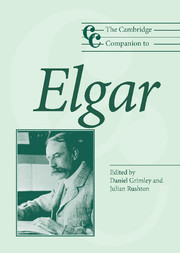Book contents
- Frontmatter
- 1 Introduction
- 2 Elgar and his British contemporaries
- 3 Elgar and his publishers
- 4 Magic by mosaic: some aspects of Elgar's compositional methods
- 5 Elgar's musical language: the shorter instrumental works
- 6 The early choral works
- 7 Elgar's later oratorios: Roman Catholicism, decadence and the Wagnerian dialectic of shame and grace
- 8 Roman Catholicism and being musically English: Elgar's church and organ music
- 9 ‘A smiling with a sigh’: the chamber music and works for strings
- 10 In search of the symphony: orchestral music to 1908
- 11 The later orchestral music (1910–34)
- 12 Elgar's unwumbling: the theatre music
- 13 Elgar and recording
- 14 Broadcasting's ally: Elgar and the BBC
- 15 Elgar in German criticism
- 16 Functional music: imperialism, the Great War, and Elgar as popular composer
- Notes
- Select bibliography
- Index
8 - Roman Catholicism and being musically English: Elgar's church and organ music
Published online by Cambridge University Press: 28 September 2011
- Frontmatter
- 1 Introduction
- 2 Elgar and his British contemporaries
- 3 Elgar and his publishers
- 4 Magic by mosaic: some aspects of Elgar's compositional methods
- 5 Elgar's musical language: the shorter instrumental works
- 6 The early choral works
- 7 Elgar's later oratorios: Roman Catholicism, decadence and the Wagnerian dialectic of shame and grace
- 8 Roman Catholicism and being musically English: Elgar's church and organ music
- 9 ‘A smiling with a sigh’: the chamber music and works for strings
- 10 In search of the symphony: orchestral music to 1908
- 11 The later orchestral music (1910–34)
- 12 Elgar's unwumbling: the theatre music
- 13 Elgar and recording
- 14 Broadcasting's ally: Elgar and the BBC
- 15 Elgar in German criticism
- 16 Functional music: imperialism, the Great War, and Elgar as popular composer
- Notes
- Select bibliography
- Index
Summary
His Majesty is . . . inclined to appoint some eminent musician [as Master of the King’s Music], but the question arises as to who this should be. Sir Edward Elgar has applied for the post and . . . it seems difficult to resist his claims. At the same time it is generally thought that Vaughan Williams is the most representative of British Music; Elgar having always adopted German methods.
(sir fredrick ponsonby, 1924)It might seem odd that, in the 1920s, some thought Elgar unrepresentative of British music; there is no doubt that he had been held as supremely British – or at least English – during the Edwardian era, and he was to become regarded thus again. But this exception does go some way to prove the rule that no music is essentially intrinsic to any nationality: certain traits may become associated with nationhood, as much by the composer as by the audience, but these associations are just as provisional as any other connotations music might hold. To Ponsonby's generation, Vaughan Williams and his generation had tapped the roots of Englishness by rediscovering the folk repertory and returning to the idioms of the Tudor and Elizabethan eras. Elgar's idiom lacked this purity, perhaps even representing the false imperial optimism that lay at the roots of the Great War; moreover, Elgar did not have the luxury of erasing his Germanic musical roots – as the royal family had managed to do with its dynastic title.
- Type
- Chapter
- Information
- The Cambridge Companion to Elgar , pp. 106 - 119Publisher: Cambridge University PressPrint publication year: 2005
- 2
- Cited by



